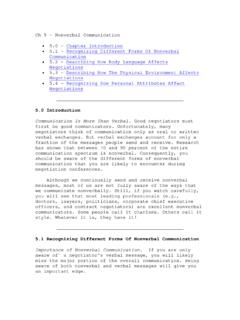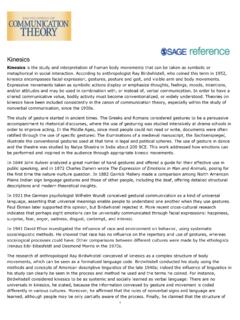Transcription of 10 Communication Tips for Dementia Caregivers
1 10 Communication Tips for Dementia Caregivers 10 Communication TIPS FOR Dementia Caregivers 2. INTRODUCTION. Communication the expressive or receptive exchange of information . is vital to the functional success and emotional well-being of a person with Dementia . Yet difficulty expressing needs and/. or understanding another person is common when someone has Alzheimer's disease or another form Expressive Communication of Dementia . And Communication involves expressing one's breakdowns can be extremely stressful for both the person with needs and thoughts through Dementia and the caregiver. They speech, body language, can also contribute significantly facial expressions, etc. to excess disability. Receptive Communication But you have the power to involves understanding communicate effectively with the communications of someone who has Dementia .
2 Throughout every stage of their others, through their disease by adapting your speech, body language, Communication style. facial expressions, etc. 10 Communication TIPS FOR Dementia Caregivers 3. ADAPTING YOUR. Communication . STYLE. Never underestimate the powerful impact you have on someone you provide care for. As a care partner, you are the most important tool for facilitating a positive experience . A person-centered for the person and for you. approach that's grounded When it comes to communicating in dignity and respect is with someone who has Dementia , a key to communicating ask yourself: effectively with a person How can I adapt to this person, who has Dementia . instead of them adapting to me? . Use the tips on the following pages to adapt your Communication style, and you'll help improve the person's function, emotional well-being, and quality of life.
3 10 Communication TIPS FOR Dementia Caregivers 4. EXAMPLES. Ed, is your daughter TIP 1: Gain Attention and Trust. coming to see you today? . Before you speak, make sure you have gained the person's attention. Good morning, Betty. It's It's also important that the person in your care time to go to breakfast.. feels safe with you and that you have his or her agreement and approval to proceed. Les, would you like to take a walk? . 10 Communication TIPS FOR Dementia Caregivers 5. TIP 2: Approach From the Front Always try to approach a person with Dementia from the front so he or she has an opportunity to recognize you. Keep in mind too that in the later stages of Dementia , the person's range of vision may become more limited, so you may need to make further adaptations. Before speaking, make direct eye contact (unless it's culturally unacceptable) and stand or sit in front of the person so that you're at their eye level.
4 Maintaining eye contact during the conversation helps show that you're listening. It also builds trust, promotes respect, and lets the person know that you care about them. 10 Communication TIPS FOR Dementia Caregivers 6. EXAMPLES TIP 3: Minimize Frances, can I take your Distractions sweater to the laundry? People who live with Dementia are often easily distracted by both sights and sounds. Mr. Ferris, can you turn Before communicating, try to eliminate all unnecessary sources of stimulation. the volume down on If you need to handle someone's personal your radio? belongings, be sure to ask his or her permission first. Helen, let's put these magazines away until after lunch.. 10 Communication TIPS FOR Dementia Caregivers 7. TIP 4: Lead With the Person's Name Calling a person with Dementia by their name shows respect, and identifying yourself often helps the person with orientation.
5 Leading with the person's name will also catch their attention, improving their ability to attend to your question or request. EXAMPLES. Hi Mrs. Turner, I'm Carrie. Are you ready to play cards? . Good morning, Ethel. You have a visitor coming today, don't you? . George, it's Becky. How are you feeling today? . 10 Communication TIPS FOR Dementia Caregivers 8. TIP 5: Avoid Pronouns EXAMPLES Referring to a book as it or to a person's son as he can seem logical to someone who Marvin, when did Arlene does not have a cognitive disability. But for leave? (not she ) someone who has Dementia , pronouns can often frustrate and confuse. What is it, and who is he ? Caroline, can you put To be clear, speak clearly. Use simple your shirt in the basket? sentences, and avoid words like it, he, his, she, her, them, they, those, etc. as much (not it ).
6 As possible. Tony, let's give the books back to Jerry and Allen.. (not them ). 10 Communication TIPS FOR Dementia Caregivers 9. TIP 6: Use Short Sentences EXAMPLES. Long sentences filled with lots of Bob, your son will information can be confusing to someone with Dementia . A sentence be here soon.. like Turn the water on and wash your face because your daughter is coming to see you this afternoon and we want Mr. Gibson, turn on the you to be freshened up before her water.. visit will most likely not be fully understood. Barbara, use the towel.. Keep your sentences short and to the point. 10 Communication TIPS FOR Dementia Caregivers 10. TIP 7: Wait for a Response. Research shows that response time for a person with Dementia can be delayed by up to 30 seconds. For you as a caregiver, this delay might be frustrating sometimes.
7 It's also easy to misinterpret a delay as the person's inability to comprehend your message. When communicating with someone who has Dementia , allow time for them to process your words. During processing, do not distract the person. Be patient and you will often receive the response you might otherwise have missed. 10 Communication TIPS FOR Dementia Caregivers 11. TIP 8: Use Visual or EXAMPLES. Tactile Cues While saying Please brush Words alone may not be enough to convey your hair, demonstrate the meaning of your message. This can lead the movement of hair to a lack of response and the conclusion that the person cannot or will not do brushing. what you're asking. Use visual demonstrations and tactile/hands- While saying Raise your on cues to illustrate your words. arm, raise your arm to demonstrate. While saying It's time to eat, put your hand to your mouth to simulate eating.
8 10 Communication TIPS FOR Dementia Caregivers 12. TIP 9: Watch Your Nonverbal Messages A key aspect of Communication is nonverbal. In addition to the words you use, your tone of voice, volume, body language, and facial expressions also send a message every time you speak. Nonverbal messages can be both intentional and unintentional, so be careful not to change the meaning of your message with your nonverbal cues. EXAMPLES. Keep your volume at a normal level (unless the person is hard of hearing). Avoid crossing your arms, as this can indicate impatience or tension. Remember that a smile is often contagious. 10 Communication TIPS FOR Dementia Caregivers 13. TIP 10: Be Patient, Supportive, and Friendly At every stage of Dementia , there is a to express support, such as touches person behind the patient. and smiles. When it comes to how someone with Remember that good Communication Dementia communicates, let them brings rewards to both the sender and know that they have your full attention.
9 The receiver. Focus on the feelings related to their Communication , not just the facts. Whenever possible and appropriate, use additional forms of Communication Ten Tips for Communicating with a Person with Dementia Caring for a person with Dementia poses many challenges for families and Caregivers . People with Dementia from conditions such as Alzheimer's and related diseases have a progressive brain disorder that makes it more and more difficult for them to remember things, think clearly, communicate with others, or take care of themselves. In addition, Dementia can cause mood swings and even change a person's personality and behavior. This fact sheet provides some practical strategies for dealing with the troubling behavior problems and Communication difficulties often encountered when caring for a person with Dementia .
10 Improving your Communication skills will help make caregiving less stressful and will likely improve the quality of your relationship with your consumer. Good Communication skills will also enhance your ability to handle the difficult behavior you may encounter as you care for a person with a dementing illness. 1. Set a positive mood for interaction. Your attitude and body language communicate your feelings and thoughts stronger than your words. Set a positive mood by speaking to your consumer in a pleasant and respectful manner. Use facial expressions, tone of voice, and physical touch when appropriate to help convey your message and show your feelings of affection. 2. Get the person's attention. Limit distractions and noise turn off the radio or TV, close the curtains or shut the door, or move to quieter surroundings.







